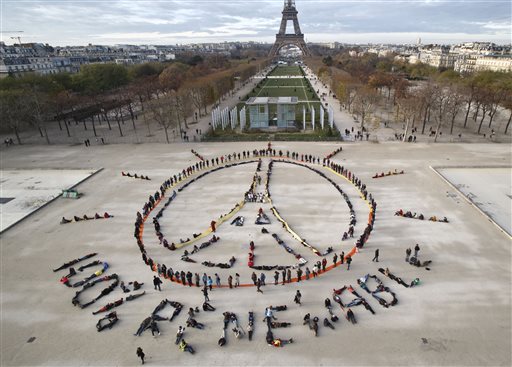
In this Dec. 6, 2015 file photo, environmentalist activists form a human chain representing the peace sign and the spelling out “100% renewable”, on the side line of the COP21, United Nations Climate Change Conference near the Eiffel Tower in Paris. AP file photo
Bonn, Germany—Countries from the developing world urged developed countries to include assessments on carbon emissions before 2020 in the agenda of ongoing climate talks at the COP 23 in Bonn, Germany.
This comes a day after US and European Union (EU) negotiators blocked the inclusion of checking emission targets before 2020 during a negotiation on November 8.
“We don’t think that this agenda item will reduce one single ton of emissions and it will not add to climate finance,” a representative of the EU said after a US delegate complained on the lack of time to discuss another agenda in the deliberations.
Global leaders are in Bonn, Germany to discuss climate policy and advance the rulebook for the implementation of the Paris Agreement, a climate treaty that seeks to limit the rise of global temperatures well below 2˚C.
Emission reductions must start now to reach target by 2020
“When you set a target of (limiting global temperature) 1.5˚C by 2020, you don’t start the emission reductions on 2020. You start immediately to achieve that goal,” Gerry Arances, executive director of the Center for Energy Ecology and Development said.
Arances said that the move by EU and US representatives is “adding insult to injustice,” as the negotiations coincided with the commemoration of Typhoon Haiyan, a supertyphoon that killed more than 6,000 people in the provinces of Leyte and Samar in the Philippines in 2013.
If countries do not start their emissions reductions as soon as possible, he said that most countries would not be able to achieve their emission targets.
Nicaragua: We need to be relevant to people
Nicaragua, one of the last countries to sign the Paris Agreement, stated the urgency of cutting carbon emissions, especially those of developed countries.
“We were encouraged by the countries defending pre-2020 goals. We think that largely emitting developed countries should begin a dialogue in the face of an urgent matter,” Dr. Paul Oquist Kelly of the Nicaraguan delegation.
He stressed that emission cuts must be prioritized so that the effects of the Paris Agreement will be relevant to those most vulnerable to the deadly impacts of climate change.
“We need to act now to be relevant to the lives of people,” he said. /jpv
RELATED STORY
Trump announces US withdrawal from Paris climate deal